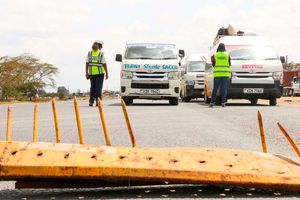High cooking gas prices persist despite tax cut

Retailers selling liquefied petroleum gas (LPG).
Retailers are still selling liquefied petroleum gas (LPG) at high prices even after the government last week halved value added tax (VAT) on the product.
The Finance Act 2022, which took effect on Friday last week, cut the tax on LPG supplies from 16 per cent to eight per cent, handing a much-needed reprieve to households in the wake of rising costs of key goods and services.
“Section 5 of the Value Added Tax Act, 2013 is amended in sub-section 2 by adding the following new paragraph immediately after paragraph (aa)-(ab) in the case of the supply of liquefied petroleum gas, including propane; eight per cent,” states the new law that was signed by President Uhuru Kenyatta last month.
The tax cut comes a year after Parliament reinstated 16 per cent VAT on cooking gas, which together with the rally in crude prices, has seen the cost of the 13kg LPG rise by Sh900 since June last year.
However, retailers have failed to cut LPG prices despite the tax cut, lengthening the pain of consumers, who were hoping for a quick reduction in the cost of the product.
A spot check by the Nation at major retailers showed the dealers were still refilling the 6kg cylinder at between Sh1,500 and Sh1,700 and the 13kg cylinder at between Sh3,200 and Sh3,500.
For instance, Total Energies Kenya was refilling the 6kg cylinder at Sh1,540 and the 13-kg gas cylinder at Sh3,330.
Energy and Petroleum Regulatory Authority (Epra) Director-General Daniel Kiptoo said he expects gas retailers to lower prices in the “next few weeks” to reflect the lower taxation.
He attributed the delay to old stock priced under the previous taxation regime, adding that dealers could be looking to fix new prices when they bring in new stock.
Epra does not regulate cooking gas prices. This means its pricing is determined by the market forces of demand and supply, a fact that gives dealers leeway to price their products according to market dynamics.
Exhaust their old stock
“The new law has only come into effect last week and so it could be that the retailers are yet to exhaust their old stock. But I expect the prices to come down in the next few weeks depending on how the market will behave,” Mr Kiptoo told the Nation.
The gains from the lower taxation could however be wiped out should the global prices of crude continue rising in the coming weeks.
Brent crude prices plunged to $108 per barrel on Friday last week, down from $114 the previous day over recession fears. They fell further to $103 on Wednesday, signalling volatility in the global oil market.
The Epra boss said construction of a common user facility would help bring certainty in the cooking gas market by enabling the government to control the prices of LPG as it does those of petrol, diesel and kerosene.
The state-owned Kenya Pipeline Company (KPC) is all set to build an LPG storage facility at the Kenya Petroleum Refineries Ltd in efforts to streamline importation of cooking gas into the country.
Cooking gas is currently imported by private players who are free to set its prices.
A common user facility would, however, enable LPG to be imported through the open tender system, where firms compete to import the cheapest LPG.
“The common user facility will help us regulate the market because at the moment, the LPG industry is driven by market dynamics,” said Mr Kiptoo.





